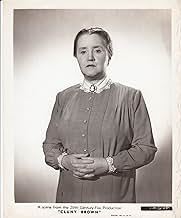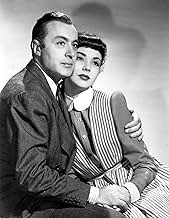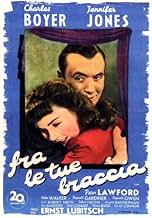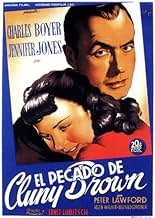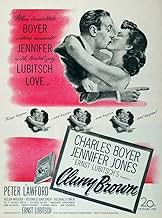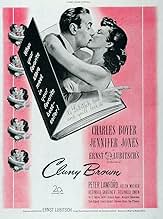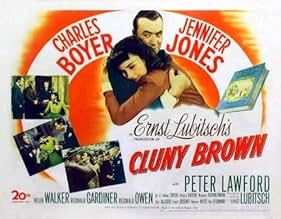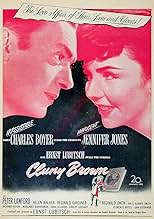NOTE IMDb
7,4/10
4,4 k
MA NOTE
Une femme de chambre ouverte d'esprit et un réfugié tchèque surprennent un village anglais avec leurs manières non conventionnelles.Une femme de chambre ouverte d'esprit et un réfugié tchèque surprennent un village anglais avec leurs manières non conventionnelles.Une femme de chambre ouverte d'esprit et un réfugié tchèque surprennent un village anglais avec leurs manières non conventionnelles.
- Réalisation
- Scénario
- Casting principal
- Récompenses
- 3 victoires au total
C. Aubrey Smith
- Col. Charles Duff Graham
- (as Sir C. Aubrey Smith)
Norman Ainsley
- Mr. Tupham
- (non crédité)
Billy Bevan
- Uncle Arn Porritt
- (non crédité)
Whit Bissell
- Archie
- (non crédité)
Bette Rae Brown
- Girl at Party
- (non crédité)
Charles Coleman
- Constable Birkins
- (non crédité)
Avis à la une
For years I had searched for this movie in the vain hope of ever finding it. Till last night I found it on Youtube. My sincere thanks to the person who uploaded it and gave me the chance at last to see this little treasure.
I'm curious to know how today's movie going audience brought up on a combination of action adventure and mindless idiocy would come to this movie. Its so far out of what's being made to today as to be from a totally different world. And yet I would like to think that people would love it for what it is, a charming piece of old world cinema.
It is possible that this movie could be made today. Though I'm not sure who would be able to play all the parts with the sincerity the cast do in the movie without going over the top. Especially I wonder who could play a character like Cluny with the charm and depth that Jennifer Jones brings to it.
Jennifer Jones's Cluny is one of the most captivating characters I've ever met on screen. So engaging, so charming, so innocent.
Jennifer Jones acting is sublime. I couldn't help but watch the different expressions on her face through each emotion she was going through. Good facial expression is always for a me a good sign that the actress is immersed fully in the part.
Charles Boyer's Adam Belinski must be the kind of man women dream about meeting but probably never will. Handsome, french accent, worldly wise, kind, gentle, understanding. He is of cause the perfect man for Cluny as against the boring Wilson played with great verve by Richard Haydn. I hated the character, lol. But I thought Haydn's performance quite brilliant too.
The rest of the cast do a fine job too. And the ending is perfect.
I'm curious to know how today's movie going audience brought up on a combination of action adventure and mindless idiocy would come to this movie. Its so far out of what's being made to today as to be from a totally different world. And yet I would like to think that people would love it for what it is, a charming piece of old world cinema.
It is possible that this movie could be made today. Though I'm not sure who would be able to play all the parts with the sincerity the cast do in the movie without going over the top. Especially I wonder who could play a character like Cluny with the charm and depth that Jennifer Jones brings to it.
Jennifer Jones's Cluny is one of the most captivating characters I've ever met on screen. So engaging, so charming, so innocent.
Jennifer Jones acting is sublime. I couldn't help but watch the different expressions on her face through each emotion she was going through. Good facial expression is always for a me a good sign that the actress is immersed fully in the part.
Charles Boyer's Adam Belinski must be the kind of man women dream about meeting but probably never will. Handsome, french accent, worldly wise, kind, gentle, understanding. He is of cause the perfect man for Cluny as against the boring Wilson played with great verve by Richard Haydn. I hated the character, lol. But I thought Haydn's performance quite brilliant too.
The rest of the cast do a fine job too. And the ending is perfect.
This is a very clever, witty, wacky, screwball, satire comedy of people, place and manners. From its source to the script, acting and production, "Cluny Brown" is a masterpiece of film comedy. This is one of the cleverest, funniest and most entertaining movies I've ever seen. The script is witty, filled with hilarious dialog, and sprinkled with frequent clever sidesteps and detours. Such would normally make a film disjointed and hard to follow. But here the short distractions work beautifully to make it like a screwball comedy. All of this makes for a very funny, wacky and subtly satirical film.
The film begins in London in June of 1938. World War II had not yet begun. The book on which the film is based, was a 1944 novel of the same title. The world was deeply into the war when Margery Sharp wrote the novel, but the outcome was far from certain. Yet, the war was well over by the summer of 1946 when this film came out. Part of the spoofery of the film is of the ignorance about the world scene among some of the upper peerage of England.
Ernst Lubitsch directed some of the best political satire films, and this was the last movie he completed before his death in 1947 of a heart attack at age 55. Besides a great plot and excellent screenplay, this film has a marvelous cast. The acting is superb from the leads down to the smallest of roles. The supporting cast reads like a who's who of U.K. actors of the day.
The script is so chock-full of humor that this film needs a second, third and even fourth viewing. It gets better each time as one notices more of the short retorts, smart snippets and wacky lines. Many of the cast were worthy of Oscar nominations in 1946. But it was a year of many great films, most of which were serious fare in the aftermath of war. Still, "Cluny Brown" was a hit on both sides of the pond. Had it been made three or four years later, it surely would have captured some major awards.
As Cluny, Jennifer Jones shows her aptitude for comedy as well as drama. She was nominated for an Oscar in another film of 1946, the Western drama, "Duel in the Sun." She won an Oscar and Golden Globe for "The Song of Bernadette" in 1943. Jones clearly is one of the great actresses of the silver screen.
Cluny's fixation for plumbing is matched by Adam Belinski's observance of the squirrels and nuts in Hyde Park. Charles Boyer is at his comedic best as the Czech writer who fled his native Budapest ahead of the Nazis.
Each one of the rest of the cast who play English lords, ladies, servants and tradesmen, is ideal in his or her role. Reginald Owen is hilarious as Sir Henry Carmel. Margaret Bannerman has a role much like one that Billie Burke often played. She is something of a dingbat with moments of clarity. Peter Lawford is very funny as Andrew Carmel, and Helen Walker is a scream as Betty Cream. The pretentious Andrew can't stand the pretentious Cream, but he pines for her constantly. Richard Haydn is howlingly funny as the snobbish chemist (we Yanks would call him a druggist), Jonathan Wilson. Una O'Connor was never funnier, without saying a single word. The servants of the Carmels are a hoot, and Reginald Gardiner, Billy Bevan and all the rest provide shots of humor.
Author Margery Sharp (1905-1991) was a sort of Jane Austen of the 20th century. With more than two dozen novels and many short stories and plays to her credit, she was well known. A number of her stories have been put on film. "Julia Misbehaves" of 1948 is another great comedy with Greer Garson, Walter Pidgeon, and Cesar Romero.
Here are some favorite lines from this film. For more great dialog, see the Quotes section under this IMDb Web page of the movie.
Hilary Ames, "If plumbing's going to make a go of it in this country, the plumbers jolly well better get into the spirit of the thing."
Andrew Carmel, "Good heavens." Betty Cream, "What's the matter?" Andrew, "It's Belinski." ... Betty, "Is he a gangster?" Andrew, "Don't be an idiot, Betty. He's a Czech."
Sir Henry Carmel, "You mean to tell me young girls go in for plumbing nowadays?... When I was a young man, we never even discussed plumbing. As a matter of fact, we didn't have any."
Lady Alice Carmel, "If England must produce Belinskis, why we will produce Belinskis. Britain has never failed. Now have your tea, dear."
Andrew Carmel, "Oh, you can't call a man broke just because he hasn't any money."
Lady Alice Carmel, "So many foreigners do have foreign names, don't they?"
Syrette, "What do you expect? Maid without references, and a foreigner who isn't even in the diplomatic service."
Cluny Brown, "Poor little sheep. It hasn't much future, has it? Just mutton." Jonathan Wilson, "And where would England be without it? If I was a sheep, I should be proud to serve the empire."
Jonathan Wilson, "Mother doesn't waste words on flattery. If she speaks, it's to correct faults."
Adam Belinski, "No, Sir Henry. I know Hitler." Sir Henry Carmel, "Oh, yes, he's written a book, hasn't he?... What's it called? Oh, yes, "My Camp." Belinski, "Yes, it's a kind of outdoor book. The old German idea of sport. Not your kind of sport.
Syrette, "I shall never forget the day she dusted the left eye out of Sir Henry's moose."
Cluny Brown, "You know, Mr. Belinski, men just don't marry plumbers."
Cluny Brown, "He told me what he thought of me. Some of it was in Latin."
The film begins in London in June of 1938. World War II had not yet begun. The book on which the film is based, was a 1944 novel of the same title. The world was deeply into the war when Margery Sharp wrote the novel, but the outcome was far from certain. Yet, the war was well over by the summer of 1946 when this film came out. Part of the spoofery of the film is of the ignorance about the world scene among some of the upper peerage of England.
Ernst Lubitsch directed some of the best political satire films, and this was the last movie he completed before his death in 1947 of a heart attack at age 55. Besides a great plot and excellent screenplay, this film has a marvelous cast. The acting is superb from the leads down to the smallest of roles. The supporting cast reads like a who's who of U.K. actors of the day.
The script is so chock-full of humor that this film needs a second, third and even fourth viewing. It gets better each time as one notices more of the short retorts, smart snippets and wacky lines. Many of the cast were worthy of Oscar nominations in 1946. But it was a year of many great films, most of which were serious fare in the aftermath of war. Still, "Cluny Brown" was a hit on both sides of the pond. Had it been made three or four years later, it surely would have captured some major awards.
As Cluny, Jennifer Jones shows her aptitude for comedy as well as drama. She was nominated for an Oscar in another film of 1946, the Western drama, "Duel in the Sun." She won an Oscar and Golden Globe for "The Song of Bernadette" in 1943. Jones clearly is one of the great actresses of the silver screen.
Cluny's fixation for plumbing is matched by Adam Belinski's observance of the squirrels and nuts in Hyde Park. Charles Boyer is at his comedic best as the Czech writer who fled his native Budapest ahead of the Nazis.
Each one of the rest of the cast who play English lords, ladies, servants and tradesmen, is ideal in his or her role. Reginald Owen is hilarious as Sir Henry Carmel. Margaret Bannerman has a role much like one that Billie Burke often played. She is something of a dingbat with moments of clarity. Peter Lawford is very funny as Andrew Carmel, and Helen Walker is a scream as Betty Cream. The pretentious Andrew can't stand the pretentious Cream, but he pines for her constantly. Richard Haydn is howlingly funny as the snobbish chemist (we Yanks would call him a druggist), Jonathan Wilson. Una O'Connor was never funnier, without saying a single word. The servants of the Carmels are a hoot, and Reginald Gardiner, Billy Bevan and all the rest provide shots of humor.
Author Margery Sharp (1905-1991) was a sort of Jane Austen of the 20th century. With more than two dozen novels and many short stories and plays to her credit, she was well known. A number of her stories have been put on film. "Julia Misbehaves" of 1948 is another great comedy with Greer Garson, Walter Pidgeon, and Cesar Romero.
Here are some favorite lines from this film. For more great dialog, see the Quotes section under this IMDb Web page of the movie.
Hilary Ames, "If plumbing's going to make a go of it in this country, the plumbers jolly well better get into the spirit of the thing."
Andrew Carmel, "Good heavens." Betty Cream, "What's the matter?" Andrew, "It's Belinski." ... Betty, "Is he a gangster?" Andrew, "Don't be an idiot, Betty. He's a Czech."
Sir Henry Carmel, "You mean to tell me young girls go in for plumbing nowadays?... When I was a young man, we never even discussed plumbing. As a matter of fact, we didn't have any."
Lady Alice Carmel, "If England must produce Belinskis, why we will produce Belinskis. Britain has never failed. Now have your tea, dear."
Andrew Carmel, "Oh, you can't call a man broke just because he hasn't any money."
Lady Alice Carmel, "So many foreigners do have foreign names, don't they?"
Syrette, "What do you expect? Maid without references, and a foreigner who isn't even in the diplomatic service."
Cluny Brown, "Poor little sheep. It hasn't much future, has it? Just mutton." Jonathan Wilson, "And where would England be without it? If I was a sheep, I should be proud to serve the empire."
Jonathan Wilson, "Mother doesn't waste words on flattery. If she speaks, it's to correct faults."
Adam Belinski, "No, Sir Henry. I know Hitler." Sir Henry Carmel, "Oh, yes, he's written a book, hasn't he?... What's it called? Oh, yes, "My Camp." Belinski, "Yes, it's a kind of outdoor book. The old German idea of sport. Not your kind of sport.
Syrette, "I shall never forget the day she dusted the left eye out of Sir Henry's moose."
Cluny Brown, "You know, Mr. Belinski, men just don't marry plumbers."
Cluny Brown, "He told me what he thought of me. Some of it was in Latin."
Ernest Lubitsch used the charms and abilities of his leads Charles Boyer and Jennifer Jones to get some maximum performances out of them and make his next to last film Cluny Brown a great success. I've not heard that Lubitsch had to contend with Jennifer's husband and Svengali David O. Selznick on the set, but it's a safe bet they clashed because Selznick could not help interjecting himself where his wife was concerned.
Jones is the daughter of English plumber Billy Bevan and the most interesting thing is that in this English setting her non-English speech pattern is perfectly acceptable even against Bevan's cockney accent. Jones was also perfectly acceptable in another English part in Love Letters and certainly got no criticism. The camera always loved Jennifer Jones and in parts like Cluny Brown as the girl next door she lit up the screen.
Boyer as often as not played a whole lot of European types not necessarily French. Here he's a Czech refugee over in the United Kingdom fleeing from Mr. Hitler. The film is set in Neville Chamberlain Great Britain and Boyer is one of many bringing unpleasant news to the British public.
After Bevan rescues Jones from Boyer and Reginald Gardiner Jones is placed as a maid at a country estate where she meets Boyer again. There should be some class barriers, but Boyer breaks them down and Jones is more than agreeable.
Lots of agreeable Lubitsch touches and a minimum of Selznick interference make Cluny Brown still a treat after over 60 years.
Jones is the daughter of English plumber Billy Bevan and the most interesting thing is that in this English setting her non-English speech pattern is perfectly acceptable even against Bevan's cockney accent. Jones was also perfectly acceptable in another English part in Love Letters and certainly got no criticism. The camera always loved Jennifer Jones and in parts like Cluny Brown as the girl next door she lit up the screen.
Boyer as often as not played a whole lot of European types not necessarily French. Here he's a Czech refugee over in the United Kingdom fleeing from Mr. Hitler. The film is set in Neville Chamberlain Great Britain and Boyer is one of many bringing unpleasant news to the British public.
After Bevan rescues Jones from Boyer and Reginald Gardiner Jones is placed as a maid at a country estate where she meets Boyer again. There should be some class barriers, but Boyer breaks them down and Jones is more than agreeable.
Lots of agreeable Lubitsch touches and a minimum of Selznick interference make Cluny Brown still a treat after over 60 years.
Have seen this more than once on TV (though not for quite a few years now) and I'd be first in line if Fox Classics were to issue it on video. It's a slight bit of fluff, given the full Twentieth gloss, and elevated to sublimely sly tongue-in-cheek humor, courtesy of Herr Lubitsch. Everyone in the cast is in top form (Thank goodness David O. Selznick was willing to loan his treasure, Jennifer Jones, to Fox...She's a delight in this one!) Standouts are Sara Allgood as the mansion's oh-so-proper head housekeeper and Richard Haydn as the hilariously stuffy Mr. Wilson, Cluny's would-be suitor. The final shot of Jennifer falling in a dead faint (due to her impending, but not yet obvious maternity) seen through a 5th Avenue bookstore window, is one of the best curtains in screen annals!
... and the dialogue is just extraordinary.
Cluny Brown (Jennifer Jones) is a young English woman trying to find her place in life. She is quirky, outspoken, and she likes plumbing, mainly from watching her uncle be a plumber for years.
But she has to deal with the snobbery of all of the classes - the middle class represented in a village druggist, the servant class in the head servants in the house she works in, and the rich class. Since films of the time so often made fun of the rich, this one takes a different tack. The rich people are just agog over Czech intellectual and refugee Adam Belinski. They trip over themselves giving him money because it makes them feel like they are being a patron.
Cluny makes people uncomfortable because she does things that make her visible, when it seems that people want her to just disappear into the woodwork, to have no opinion or personality at all, including the village druggist who is considering marrying her. Belinski appreciates her fire and forwardness. He has a similar temperament, but because he is a man and an intellectual, nobody seems to mind the same behavior out of him.
I never cared for Peter Lawford in all of those collegiate MGM musical film roles, but here he is hilarious as the idealist son of a nobleman who is being treated badly by his steady girlfriend, Betty (Helen Walker), who refuses to give him clear signals as to where he stands.
Cluny Brown (Jennifer Jones) is a young English woman trying to find her place in life. She is quirky, outspoken, and she likes plumbing, mainly from watching her uncle be a plumber for years.
But she has to deal with the snobbery of all of the classes - the middle class represented in a village druggist, the servant class in the head servants in the house she works in, and the rich class. Since films of the time so often made fun of the rich, this one takes a different tack. The rich people are just agog over Czech intellectual and refugee Adam Belinski. They trip over themselves giving him money because it makes them feel like they are being a patron.
Cluny makes people uncomfortable because she does things that make her visible, when it seems that people want her to just disappear into the woodwork, to have no opinion or personality at all, including the village druggist who is considering marrying her. Belinski appreciates her fire and forwardness. He has a similar temperament, but because he is a man and an intellectual, nobody seems to mind the same behavior out of him.
I never cared for Peter Lawford in all of those collegiate MGM musical film roles, but here he is hilarious as the idealist son of a nobleman who is being treated badly by his steady girlfriend, Betty (Helen Walker), who refuses to give him clear signals as to where he stands.
Le saviez-vous
- AnecdotesThis was the last film director Ernst Lubitsch completed himself. He died the following year during the filming of La Dame au manteau d'hermine (1948).
- GaffesWhen Cluny and Adam and Hilary are in Hilary's living room, just after Cluny says "It's so wonderful to be a cat and read the Daily Mail," the boom mic can be seen in the mirror above Adam's head.
- Citations
Adam Belinski: In Hyde Park, for instance, some people like to feed nuts to the squirrels. But if it makes you happy to feed squirrels to the nuts, who am I to say, "nuts to the squirrels?"
- ConnexionsEdited into I Love Lucy: The Fox Hunt (1956)
Meilleurs choix
Connectez-vous pour évaluer et suivre la liste de favoris afin de recevoir des recommandations personnalisées
- How long is Cluny Brown?Alimenté par Alexa
Détails
Box-office
- Montant brut mondial
- 17 155 $US
- Durée1 heure 40 minutes
- Couleur
- Rapport de forme
- 1.37 : 1
Contribuer à cette page
Suggérer une modification ou ajouter du contenu manquant


